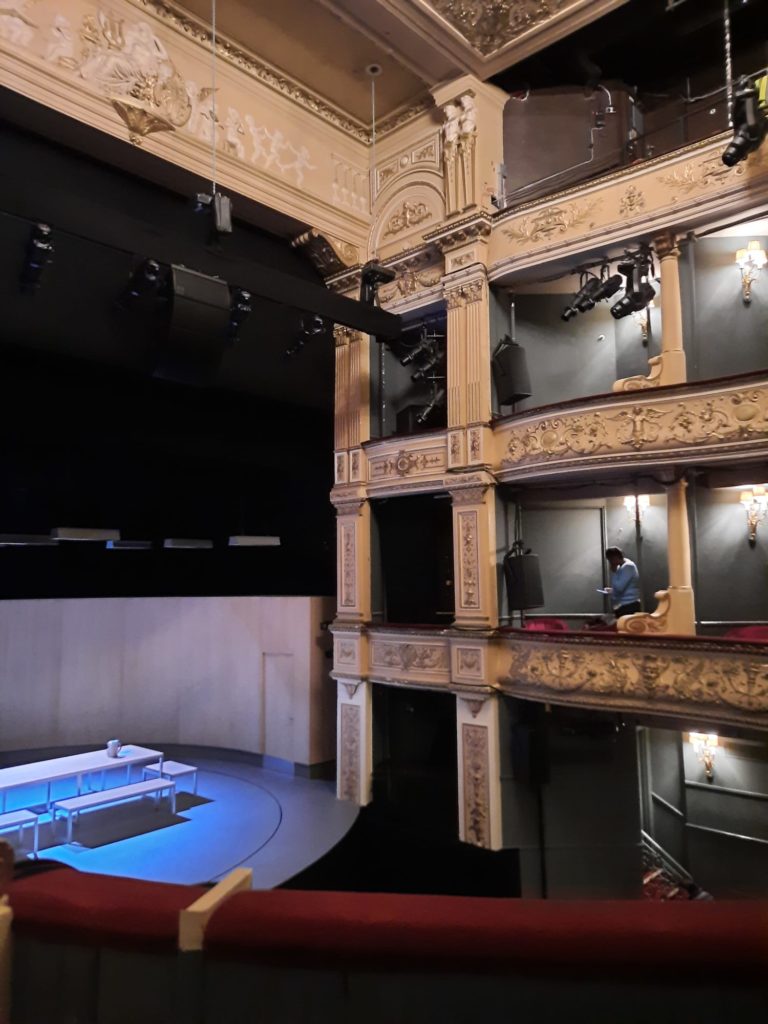The Doctor – Duke of York’s Theatre, London
A review of the West End transfer of the Almeida’s production of The Doctor, with Juliet Stevenson reprising the title role. Identity politics writ large in Robert Icke’s loose adaptation from an earlier work by Arthur Schnitzler.

The Doctor
It feels a bit like a full circle moment to be seeing Juliet Stevenson on stage. The very first time I got into a theatre after the first Covid lockdown was to see the Donmar Warehouse’s Blindness, an audio experience featuring Stevenson’s voice. Now we have traded off the intimacy and innovation of those early pandemic responses for the normalcy and comfort of theatrical full houses.
The Doctor is also a story that has come full circle. It’s loosely based on Arthur Schnitzler’s 1912 Professor Bernhardi. The title character, as in Robert Icke’s new version, is a doctor treating a patient dying of a failed abortion. Both doctors make the decision not to admit a Catholic priest to administer the last rites. Both see this as a decision made in the patient’s best interests, based on their purely rational perspective as medical professionals. Incidentally both happen to be Jewish. And both ignore growing fractures along religious, political and personal lines until the pressure causes the situation to explode.
Frankly it’s worrying how well Schnitzler’s century-old premise maps onto contemporary society. I hope that we don’t follow the same trajectory as 1912 Vienna. But we are certainly again in a position where liberal or humanist values are at odds with increasingly entrenched identity politics. Icke’s play and the Almeida’s production explore this in a few ways.
Firstly of course through the plot and dialogue: veiled anti-Semitism, intersectional identities, and an extended scene in which the futility of maintaining a black and white position in the face of multiple, stridently held viewpoints is made manifest. A sort of embodiment of vitriolic online discussion. But also through the casting: each actor plays a character whose identity differs from their own. This is more than gender-blind and colour-blind casting: as identity is so important to this play you have to listen to what the characters say in order to understand who they are. Women play men, Black actors play White characters. It’s a little bit contrived perhaps, but certainly gets you thinking.

Identity / Politics
Really what this play boils down to is this: is it an aspiration or a delusion to believe you can exist outside of identity politics? That you have no unconscious biases. That you are acting in a way that is purely rational. Maybe it’s both. Stevenson’s character Ruth Wolff is utterly convinced that sparing her patient the knowledge of her impending death (in the absence of clear evidence of her religious beliefs) was the right thing to do. But the girl’s parents, Wolff’s colleagues, the hospital board, politicians and the general public all bring their own opinions to bear. It’s certainly sufficient material to drive forward the action of the play.
The production is overall a good one. This is a play which requires a star turn in the lead role, and Stevenson carries this off. She is able to play the character with enough nuance that the audience feels sympathy for her despite her intransigence. As things come to a head, she brings realism and emotional insight to the character of Wolff. And throughout, the slowly revolving set (design by Hildegard Bechtler) and percussive soundtrack (played live from a skybox above the set by Hannah Ledwidge) ratchet up the tension.
And yet I’m not sure that this is a play that will stick in my memory. I didn’t find there was time to fully unpack all of the angles of identity politics present in the plot. This left it, as I said above, feeling in some ways contrived. I came away feeling it was a sort of state of the nation play, but with more questions than answers. Nonetheless I appreciated the chance to see it, and particularly to see Stevenson’s performance. And to reflect on which side of the conflict I would fall on, and why.
Salterton Arts Review’s rating: 3/5
The Doctor on until 11 December 2022
Trending
If you see this after your page is loaded completely, leafletJS files are missing.

